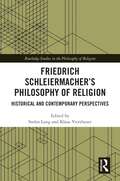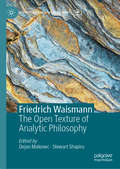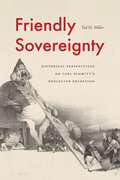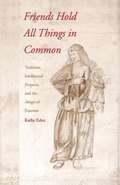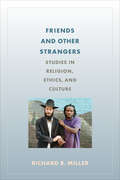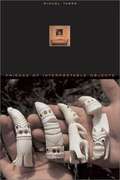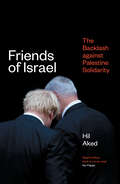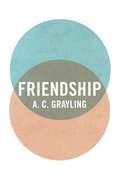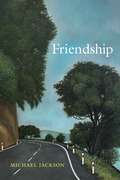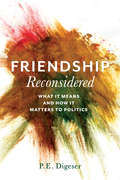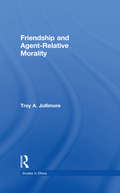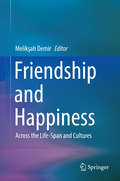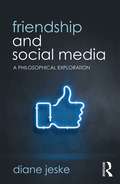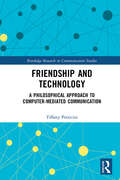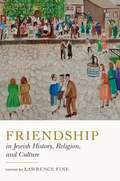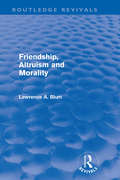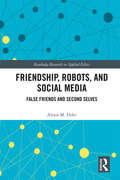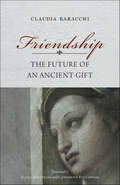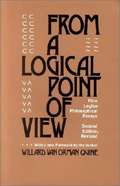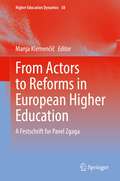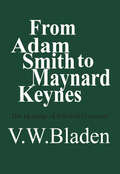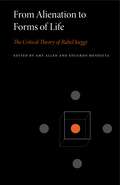- Table View
- List View
Friedrich Schleiermacher’s Philosophy of Religion: Historical and Contemporary Perspectives (Routledge Studies in the Philosophy of Religion)
by Stefan Lang Klaus ViertbauerThis volume provides a comprehensive account of Friedrich Schleiermacher’s philosophy of religion. The contributors cover the historical context of Schleiermacher’s work, specific aspects of his philosophy of religion, and the ways that his work can contribute to contemporary debates.Friedrich Schleiermacher is considered one of the outstanding representatives of 19th‑century Protestant theology. This volume brings together scholars from both continental and analytic traditions to explore Schleiermacher’s preeminent role in post‑Kantian philosophy of religion. The chapters are divided into three thematic sections. The first section situates Schleiermacher in the context of the 18th- and 19th‑century philosophy of religion. These chapters analyze his relation to thinkers such as Kant, Fichte, Hegel, Schelling, and also to Kierkegaard and Heidegger, as well as to prominent theologians in the Protestant and Catholic traditions. The second section explores different aspects of Schleiermacher’s philosophy of religion such as absolute dependence or religious feeling. Finally, the third section addresses how Schleiermacher’s insights can contribute to contemporary philosophy of religion. These chapters address current debates, particularly on religious experience, feminism, and philosophy of emotions.Friedrich Schleiermacher’s Philosophy of Religion will be of interest to scholars and advanced students working in philosophy of religion, history of philosophy, and 19th‑century religious thought.
Friedrich Waismann: The Open Texture of Analytic Philosophy (History of Analytic Philosophy)
by Stewart Shapiro Dejan MakovecThis edited collection covers Friedrich Waismann's most influential contributions to twentieth-century philosophy of language: his concepts of open texture and language strata, his early criticism of verificationism and the analytic-synthetic distinction, as well as their significance for experimental and legal philosophy. In addition, Waismann's original papers in ethics, metaphysics, epistemology and the philosophy of mathematics are here evaluated. They introduce Waismann's theory of action along with his groundbreaking work on fiction, proper names and Kafka's Trial. Waismann is known as the voice of Ludwig Wittgenstein in the Vienna Circle. At the same time we find in his works a determined critic of logical positivism and ordinary language philosophy, who anticipated much later developments in the analytic tradition and devised his very own vision for its future.
Friendly Sovereignty: Historical Perspectives on Carl Schmitt's Neglected Exception
by Ted H. MillerOver the last one hundred years, the term “sovereignty” has often been associated with the capacity of leaders to declare emergencies and to unleash harmful, extralegal force against those deemed enemies. Friendly Sovereignty explores the blind spots of this influential perspective.Ted H. Miller challenges the view of sovereignty propounded by Carl Schmitt, the Weimar and Nazi–period jurist and political theorist whose theory undergirds this understanding of sovereignty. Claiming a return to concepts of sovereignty forgotten by his liberal contemporaries, Schmitt was preoccupied with the legal exceptions required, he said, to rescue polities in crisis. Much is missing from what Schmitt harvests from the past. His framework systematically overlooks another extralegal power, one that often caused consternation, even among absolutists like Thomas Hobbes. Sovereigns also made exceptions for friends, allies, and dependents. Friendly Sovereignty plumbs the history of political thought about sovereignty to illustrate this other side of the sovereign’s exception-making power. At the core of this extensive study are three thinkers, each of whom stakes out a distinct position on the merits and demerits of a “friendly sovereign”: the nineteenth-century historian Jules Michelet, the seventeenth-century political philosopher Thomas Hobbes, and Seneca, the ancient Stoic and teacher of Nero.Analytically rigorous and thorough in its intellectual history, Friendly Sovereignty presents a more comprehensive understanding of sovereignty than the one typically taught today. It will be particularly useful to scholars and students of political theory and philosophy.
Friends Hold All Things in Common: Tradition, Intellectual Property, and the Adages of Erasmus
by Kathy EdenResponding in 1523 to a request from his friend John Botzheim, then Canon of Constance, to provide a catalogue of his works, Erasmus recalls among many other things the unfortunate events that occasioned his making a collection of Greek and Roman proverbs--the project that secured his literary fame throughout Europe and that has come down to us as the Adages.
Friends and Other Strangers: Studies in Religion, Ethics, and Culture
by Richard MillerFriends and Other Strangers argues for expanding the field of religious ethics to address the normative dimensions of culture, interpersonal desires, friendships and family, and institutional and political relationships. Richard B. Miller urges religious ethicists to turn to cultural studies to broaden the range of the issues they address and to examine matters of cultural practice and cultural difference in critical and self-reflexive ways. Friends and Other Strangers critically discusses the ethics of ethnography; ethnocentrism, relativism, and moral criticism; empathy and the ethics of self-other attunement; indignation, empathy, and solidarity; the meaning of moral responsibility in relation to children and friends; civic virtue, war, and alterity; the normative and psychological dimensions of memory; and religion and democratic public life. Miller challenges distinctions between psyche and culture, self and other, and uses the concepts of intimacy and alterity as dialectical touchstones for examining the normative dimensions of self-other relationships. A wholly contemporary, global, and interdisciplinary work, Friends and Other Strangers illuminates aspects of moral life ethicists have otherwise overlooked.
Friends of Interpretable Objects
by Miguel TamenA strikingly original work, Friends of Interpretable Objects re-anchors aesthetics in the object of attention even as it redefines the practice, processes, meaning, and uses of interpretation. Miguel Tamen's concern is to show how inanimate objects take on life through their interpretation--notably, in our own culture, as they are collected and housed in museums. It is his claim that an object becomes interpretable only in the context of a "society of friends." Thus, Tamen suggests, our inveterate tendency as human beings to interpret the phenomenal world gives objects not only a life but also a society. As his work unfolds, "friends" also takes on a legal sense, as advocates, introduced to advance the argument that the social life of interpreted and interpretable objects engenders a related web of social obligations. Focusing on those who, through interpretation, make objects "speak" in settings as different as churches, museums, forests, and distant galaxies--those who know the best interests of corporations, endangered species, and works of art--Tamen exposes the common ground shared by art criticism, political science, tort law, and science. Learned and witty, with much to teach art historians, environmentalists, anthropologists, curators, and literary critics, his book utterly reorients our understanding of how we make sense of our world.
Friends of Israel: The Backlash Against Palestine Solidarity
by Hilary Frances AkedIs there such a thing as &“the Israel lobby,&” and how powerful is it really? Friends of Israel provides a forensically researched account of the activities of Israel&’s advocates in Britain, showing how they contribute to maintaining Israeli apartheid. The book traces the history and changing fortunes of key actors within the British Zionist movement in the context of the Israeli government&’s contemporary efforts to repress a rising tide of solidarity with Palestinians expressed through the Boycott Divestment and Sanctions (BDS) movement. Offering a nuanced and politically relevant account of pro-Israel actors&’ strategies, tactics, and varying levels of success in key arenas of society, it draws parallels with the similar anti-boycott campaign waged by supporters of the erstwhile apartheid regime in South Africa. By demystifying the actors involved in the Zionist movement, the book provides an anti-racist analysis of the pro-Israel lobby which robustly rebuffs anti-Semitic conspiracies. Sensitively and accessibly written, it emphasises the complicity of British actors - both those in government and in civil society. Drawing on a range of sources including interviews with leading pro-Israel activists and Palestinian rights activists, documents obtained through Freedom of Information requests and archival material, Friends of Israel is a much-needed contribution to Israel/Palestine-related scholarship and a useful resource for the Palestine solidarity movement.
Friendship
by A. C. GraylingA central bond, a cherished value, a unique relationship, a profound human need, a type of love. What is the nature of friendship, and what is its significance in our lives? How has friendship changed since the ancient Greeks began to analyze it, and how has modern technology altered its very definition? In this fascinating exploration of friendship through the ages, one of the most thought-provoking philosophers of our time tracks historical ideas of friendship, gathers a diversity of friendship stories from the annals of myth and literature, and provides unexpected insights into our friends, ourselves, and the role of friendships in an ethical life. A. C. Grayling roves the rich traditions of friendship in literature, culture, art, and philosophy, bringing into his discussion familiar pairs as well as unfamiliar--Achilles and Patroclus, David and Jonathan, Coleridge and Wordsworth, Huck Finn and Jim. Grayling lays out major philosophical interpretations of friendship, then offers his own take, drawing on personal experiences and an acute awareness of vast cultural shifts that have occurred. With penetrating insight he addresses internet-based friendship, contemporary mixed gender friendships, how friendships may supersede family relationships, ones duty within friendship, the idea of friendship to humanity, and many other topics of universal interest.
Friendship
by Michael JacksonIn this book, renowned anthropologist Michael Jackson draws on philosophy, biography, ethnography, and literature to explore the meanings and affordances of friendship—a relationship just as significant as, yet somehow different from, kinship and love. Beginning with Aristotle’s accounts of friendship as a political virtue and Montaigne’s famous essay on friendship as a form of love, Jackson examines the tension between the political and personal resonances of friendship in the philosophy of Hannah Arendt, the biography of the Indian historian Brijen Gupta, and the oral narratives of a Kuranko storyteller, Keti Ferenke Koroma. He offers reflections on childhood friends, imaginary friends, lifelong friendships, and friendships with animals. He ruminates particularly on the complications of friendship in the context of anthropological fieldwork, exploring the contradiction between the egalitarian spirit of friendship on the one hand and, on the other, the power imbalance between ethnographers and their interlocutors.Through these stories, Jackson explores the unpredictable interplay of mutability and mutuality in intimate human relationships, and the critical importance of choice in forming friendship—what it means to be loyal to friends through good times and bad, and even in the face of danger. Through a blend of memoir, theory, ethnography, and fiction, Jackson shows us how the elective affinities of friendship transcend culture, gender, and age, and offer us perennial means of taking stock of our lives and getting a measure of our own self-worth.
Friendship Reconsidered: What It Means and How It Matters to Politics
by P. DigeserIn the history of Western thought, friendship's relationship to politics is checkered. Friendship was seen as key to understanding political life in the ancient world, but it was then ignored for centuries. Today, friendship has again become a desirable framework for political interaction. In Friendship Reconsidered, P. E. Digeser contends that our rich and varied practices of friendship multiply and moderate connections to politics. Along the way, she sets forth a series of ideals that appreciates friendship's many forms and its dynamic relationship to individuality, citizenship, political and legal institutions, and international relations. Digeser argues that, as a set of practices bearing a family resemblance to one another, friendship calls our attention to the importance of norms of friendly action and the mutual recognition of motive. Focusing on these attributes clarifies the place of self-interest and duty in friendship and points to its compatibility with the pursuit of individuality. She shows how friendship can provide islands of stability in a sea of citizen-strangers and, in a delegitimized political environment, a bridge between differences. She also explores how political and legal institutions can both undermine and promote friendship. Digeser then looks to the positive potential of international friendships, in which states mutually strive to protect the just character of one another's institutions and policies. Friendship's repertoire of motives and manifestations complicates its relationship to politics, Digeser concludes, but it can help us realize the limits and possibilities for generating new opportunities for cooperation.
Friendship Reconsidered: What It Means and How It Matters to Politics
by P. E. DigeserFriendship is an enduring subject in political theory. Theorists have long searched for a way to bring conflicting groups closer together and advance an idea of pluralism that promotes greater social harmony. In Friendship Reconsidered, P. E. Digeser supports a more diverse, complicated idea of friendship. She sets forth a series of ideals that appreciates the phenomenon's many forms and dynamic relationship to individuality, citizenship, political and legal institutions, and international relations.Digeser argues that as a set of practices resembling one another, friendship calls our attention to the importance of norms of friendly action and the mutual recognition of motive. Attention to these attributes clarifies the place of self-interest and duty in friendship and points to its compatibility with the pursuit of individuality. She shows how friendship can provide islands of stability in a sea of citizen-strangers and, in a delegitimized political environment, a bridge between differences. She also explores the ways in which political and legal institutions can undermine and promote friendship. Digeser then looks to the positive potential of international friendships, in which states mutually strive to protect the just character of one another's institutions and policies. Friendship's repertoire of motives and manifestations complicates its relationship to politics, Digeser argues, and help us realize the limits and possibilities for generating new opportunities for cooperation.
Friendship and Agent-Relative Morality (Studies in Ethics)
by Troy A. JollimoreFirst Published in 2001. Routledge is an imprint of Taylor & Francis, an informa company.
Friendship and Happiness
by Melikşah DemirThis is the first book that explicitly focuses on the relationships between various types of friendship experiences and happiness. It addresses historical, theoretical, and measurement issues in the study of friendship and happiness (e. g. , why friends are important for happiness). In order to achieve a balanced evaluation of this area as a whole, many chapters in the book conclude with a critical appraisal of what is known about the role of friendship in happiness, and provide important directions for future research. Experts from different parts of the world provide in-depth, authoritative reviews on the association between different types of friendship experiences (e. g. , friendship quantity, quality) and happiness in different age groups and cultures. An ideal resource for researchers and students of positive psychology, this rich, clear, and up-to-date book serves as an important reference for academicians in related fields of psychology such as cross-cultural, developmental and social.
Friendship and Social Media: A Philosophical Exploration (Routledge Focus on Philosophy)
by Diane JeskeFriendship is regarded as crucial to living a good life. But how does friendship make our lives better? Do all friendships make our lives better? What sorts of interactions are necessary for maintaining valuable friendships? This book answers these questions via a philosophical exploration of friendship and the ways that it contributes value to our lives. Diane Jeske uses this philosophical analysis to assess the impact of our ever-growing use of social media: Do interactions via social media interfere with our ability to maintain genuine friendships? Do such interactions undermine the contribution of friendship to the value of our lives? In addressing these topics, Jeske examines the contemporary notion of a ‘frenemy,’ the ways in which we deliberately craft our social media personas, the role of the physical body in friendship, and the ways in which social media’s exacerbation of our fear of being left out and of comparison-based envy can impact our relationships. Written in a clear and engaging style, Friendship and Social Media brings philosophical rigor and clarity to the task of determining how we can responsibly use social media in our own lives. It is essential reading for anyone interested in the ethics of interpersonal relationships and the social impact of technology.
Friendship and Technology: A Philosophical Approach to Computer Mediated Communication (Routledge Research in Communication Studies)
by Tiffany A. PetriciniThis book explores the nature of technology – participatory media in particular – and its effects on our friendships and our fundamental sense of togetherness. Situating the notion of friendship in the modern era, the author examines the possibilities and challenges of technology on our friendships. Taking a media ecology approach to interpersonal communication, she looks at issues around phenomenology, recognition of friends as unique, hermeneutics in a digital world and mediated communication, social dimensions of time and space, and communication ethics. Examining friendship as a communicative phenomenon and exploring the ways in which it is created, sustained, managed, produced, and reproduced, this book will be relevant to scholars and students of interpersonal communication, mediated communication, communication theory and philosophy, and media ecology. This book is freely available as a downloadable Open Access PDF under a Creative Commons Attribution-Non Commercial-No Derivatives 4.0 license.https://www.taylorfrancis.com/books/mono/10.4324/9781003188810/friendship-technology-tiffany-petricini
Friendship in Jewish History, Religion, and Culture (Dimyonot #12)
by Lawrence FineThe ubiquity of friendship in human culture contributes to the fallacy that ideas about friendship have not changed and remained consistent throughout history. It is only when we begin to inquire into the nature and significance of the concept in specific contexts that we discover how complex it truly is. Covering the vast expanse of Jewish tradition, from ancient Israel to the twenty-first century, this collection of essays traces the history of the beliefs, rituals, and social practices surrounding friendship in Jewish life.Employing diverse methodological approaches, this volume explores the particulars of the many varied forms that friendship has taken in the different regions where Jews have lived, including the ancient Near East, the Greco-Roman world, Europe, and the United Sates. The four sections—friendship between men, friendship between women, challenges to friendship, and friendships that cross boundaries, especially between Jews and Christians, or men and women—represent and exemplify universal themes and questions about human interrelationships. This pathbreaking and timely study will inspire further research and provide the groundwork for future explorations of the topic.In addition to the editor, the contributors are Martha Ackelsberg, Michela Andreatta, Joseph Davis, Glenn Dynner, Eitan P. Fishbane, Susannah Heschel, Daniel Jütte, Eyal Levinson, Saul M. Olyan, George Savran, and Hava Tirosh-Samuelson.
Friendship in Jewish History, Religion, and Culture (Dimyonot: Jews and the Cultural Imagination #12)
by Lawrence FineThe ubiquity of friendship in human culture contributes to the fallacy that ideas about friendship have not changed and remained consistent throughout history. It is only when we begin to inquire into the nature and significance of the concept in specific contexts that we discover how complex it truly is. Covering the vast expanse of Jewish tradition, from ancient Israel to the twenty-first century, this collection of essays traces the history of the beliefs, rituals, and social practices surrounding friendship in Jewish life.Employing diverse methodological approaches, this volume explores the particulars of the many varied forms that friendship has taken in the different regions where Jews have lived, including the ancient Near East, the Greco-Roman world, Europe, and the United Sates. The four sections—friendship between men, friendship between women, challenges to friendship, and friendships that cross boundaries, especially between Jews and Christians, or men and women—represent and exemplify universal themes and questions about human interrelationships. This pathbreaking and timely study will inspire further research and provide the groundwork for future explorations of the topic.In addition to the editor, the contributors are Martha Ackelsberg, Michela Andreatta, Joseph Davis, Glenn Dynner, Eitan P. Fishbane, Susannah Heschel, Daniel Jütte, Eyal Levinson, Saul M. Olyan, George Savran, and Hava Tirosh-Samuelson.
Friendship, Altruism and Morality (Routledge Revivals)
by Laurence A. BlumFriendship, Altruism, and Morality, originally published in 1980, gives an account of "altruistic emotions" (compassion, sympathy, concern) and friendship that brings out their moral value. Blum argues that moral theories centered on rationality, universal principle, obligation, and impersonality cannot capture this moral importance. This was one of the first books in contemporary moral philosophy to emphasize the moral significance of emotions, to deal with friendship as a moral phenomenon, and to challenge the rationalism of standard interpretations of Kant, although Blum’s "sentimentalism" owes more to Schopenhauer than to Hume. It was a forerunner to care ethics, and feminist ethics more generally; to virtue ethics; and to subsequent influential interpretations of Kant that attempted to room for altruistic emotion and friendship, and other forms of particularism and partialism. In addition, the work has been widely influential in religious studies, political theory, bioethics, and feminist ethics.
Friendship, Robots, and Social Media: False Friends and Second Selves (Routledge Research in Applied Ethics)
by Alexis M. ElderVarious emerging technologies, from social robotics to social media, appeal to our desire for social interactions, while avoiding some of the risks and costs of face-to-face human interaction. But can they offer us real friendship? In this book, Alexis Elder outlines a theory of friendship drawing on Aristotle and contemporary work on social ontology, and then uses it to evaluate the real value of social robotics and emerging social technologies. In the first part of the book Elder develops a robust and rigorous ontology of friendship: what it is, how it functions, what harms it, and how it relates to familiar ethical and philosophical questions about character, value, and well-being. In Part II she applies this ontology to emerging trends in social robotics and human-robot interaction, including robotic companions for lonely seniors, therapeutic robots used to teach social skills to children on the autism spectrum, and companionate robots currently being developed for consumer markets. Elder articulates the moral hazards presented by these robots, while at the same time acknowledging their real and measurable benefits. In the final section she shifts her focus to connections between real people, especially those enabled by social media. Arguing against critics who have charged that these new communication technologies are weakening our social connections, Elder explores ways in which text messaging, video chats, Facebook, and Snapchat are enabling us to develop, sustain, and enrich our friendship in new and meaningful ways.
Friendship: The Future of an Ancient Gift (Studies in Continental Thought)
by Claudia BaracchiIn Friendship, Italian philosopher Claudia Baracchi explores the philosophical underpinnings of friendship. Tackling the issue of friendship in the era of Facebook and online social networks requires courage and even a certain impertinence. The friendship relationship involves trust, fidelity, and availability for profound sharing. Sociologists assure us this attitude was never more improbable than in our time of dramatic anthropological reconfiguration. Research on friendship cannot therefore ignore ancient thought: with unparalleled depth, Friendship examines the broader implications of relationship, both emotional and political. Today, the grand socio-political structures of the world are trembling. The hold of valued paradigms that traditionally positioned individuals, determined their destinies, and assigned them their roles and reciprocal responsibilities is becoming uncertain. In these many global shifts, previously unforeseen possibilities for individual and collective becoming are unleashed. Perhaps friendship has to do with worlds that are not: that are not yet, and that should be desired all the more. Focusing on the works of Aristotle, Baracchi explores ancient reflections on friendship, in the belief that they have much to teach us about our relationships in the present day.
From A Logical Point Of View: Nine Logico-philosophical Essays
by Willard van Orman QuineSeveral of these essays have been printed whole in journals; others are in varying degrees new. Two main themes run through them. One is the problem of meaning, particularly as involved in the notion of an analytic statement. The other is the notion of ontological, commitment, particularly as involved in the problem of universals.
From Actors to Reforms in European Higher Education: A Festschrift for Pavel Zgaga (Higher Education Dynamics #58)
by Manja KlemenčičThis volume addresses the conceptions of actors and actorhood in higher education research. It explores the range of actors that are (or should be) recognized and theorized in higher education research, the processes that shape actorhood in the higher education reforms and explores the relations between the actors and higher education reforms. Drawing on a range of theoretical frameworks and research projects, the volume provides in-depth analyses of higher education actors and reform issues through institutional, system or international comparative perspective. The volume celebrates and is in conversation with the intellectual contributions of Professor Pavel Zgaga whose work advances our understanding of actors and actorhood in higher education and higher education reforms.
From Adam Smith to Maynard Keynes: The Heritage of Political Economy
by Vincent BladenIn this survey of the great exponents of the classical tradition, Vincent Bladen examines the thought and works of Adam Smith, T.R. Malthus, Henry Thornton, David Ricardo, J.S. Mill, Karl Marx, W.S. Jevons, Alfred Marshall, and John Maynard Keynes, and relates their views to modern situations. This is a personal introduction by one of Canada's senior economists to some of the great books in the English literature of political economy. Vincent Bladen wrote it to induce an interest in and an understanding of the economic classics, in the belief that contemplation of those works will increase our understanding of current economic writing and current economic problems.For the purpose of discussing the development of 'wealth'--the major concern of economists--Bladen defines four periods within the classical tradition, and demonstrates that in each there appeared a characteristic preoccupation with a particular area of economics. From Adam Smith to John Stuart Mill the principal concern was productivity and growth; the neoclassical economists represented by Jevons and Marshall emphasized the problems of allocation of given productive resources; depressions in the twenties and thirties and the impact of Keynesian theory led to a preoccupation with 'employment,' and after World War II attention shifted to 'growth.' Bladen is critical of previous histories of economic thought: 'by isolating the treatment of one element in a complex and integrated system of thought they frequently misrepresent each author's treatment of the particular element.' In this work he attempts to show each aspect of the work of the economists he has selected in the context of an integrated whole.
From Alienation to Forms of Life: The Critical Theory of Rahel Jaeggi (Penn State Series in Critical Theory #1)
by Amy Allen Eduardo MendietaThe wide-ranging work of Rahel Jaeggi, a leading voice of the new generation of critical theorists, demonstrates how core concepts and methodological approaches in the tradition of the Frankfurt School can be updated, stripped of their dubious metaphysical baggage, and made fruitful for critical theory in the twenty-first century. In this thorough introduction to Jaeggi’s work for English-speaking audiences, scholars assess and critique her efforts to revitalize critical theory.Jaeggi’s innovative work reclaims key concepts of Hegelian-Marxist social philosophy and reads them through the lens of such thinkers as Adorno, Heidegger, and Dewey, while simultaneously putting them into dialogue with contemporary analytic philosophy. Structured for classroom use, this critical introduction to Rahel Jaeggi is an insightful and generative confrontation with the most recent transformation of Frankfurt School–inspired social and philosophical critical theory. This volume features an essay by Jaeggi on moral progress and social change, essays by leading scholars engaging with her conceptual analysis of alienation and the critique of forms of life, and a Q&A between Jaeggi and volume coeditor Amy Allen. For scholars and students wishing to engage in the debate with key contemporary thinkers over the past, present, and future(s) of critical theory, this volume will be transformative.
From Alienation to Forms of Life: The Critical Theory of Rahel Jaeggi (Penn State Series in Critical Theory)
by John Christman Amy Allen Eduardo Mendieta Frederick Neuhouser Rahel Jaeggi Rocío Zambrana Robin Celikates Max Pensky Daniel LoickThe wide-ranging work of Rahel Jaeggi, a leading voice of the new generation of critical theorists, demonstrates how core concepts and methodological approaches in the tradition of the Frankfurt School can be updated, stripped of their dubious metaphysical baggage, and made fruitful for critical theory in the twenty-first century. In this thorough introduction to Jaeggi’s work for English-speaking audiences, scholars assess and critique her efforts to revitalize critical theory.Jaeggi’s innovative work reclaims key concepts of Hegelian-Marxist social philosophy and reads them through the lens of such thinkers as Adorno, Heidegger, and Dewey, while simultaneously putting them into dialogue with contemporary analytic philosophy. Structured for classroom use, this critical introduction to Rahel Jaeggi is an insightful and generative confrontation with the most recent transformation of Frankfurt School–inspired social and philosophical critical theory. This volume features an essay by Jaeggi on moral progress and social change, essays by leading scholars engaging with her conceptual analysis of alienation and the critique of forms of life, and a Q&A between Jaeggi and volume coeditor Amy Allen. For scholars and students wishing to engage in the debate with key contemporary thinkers over the past, present, and future(s) of critical theory, this volume will be transformative.
